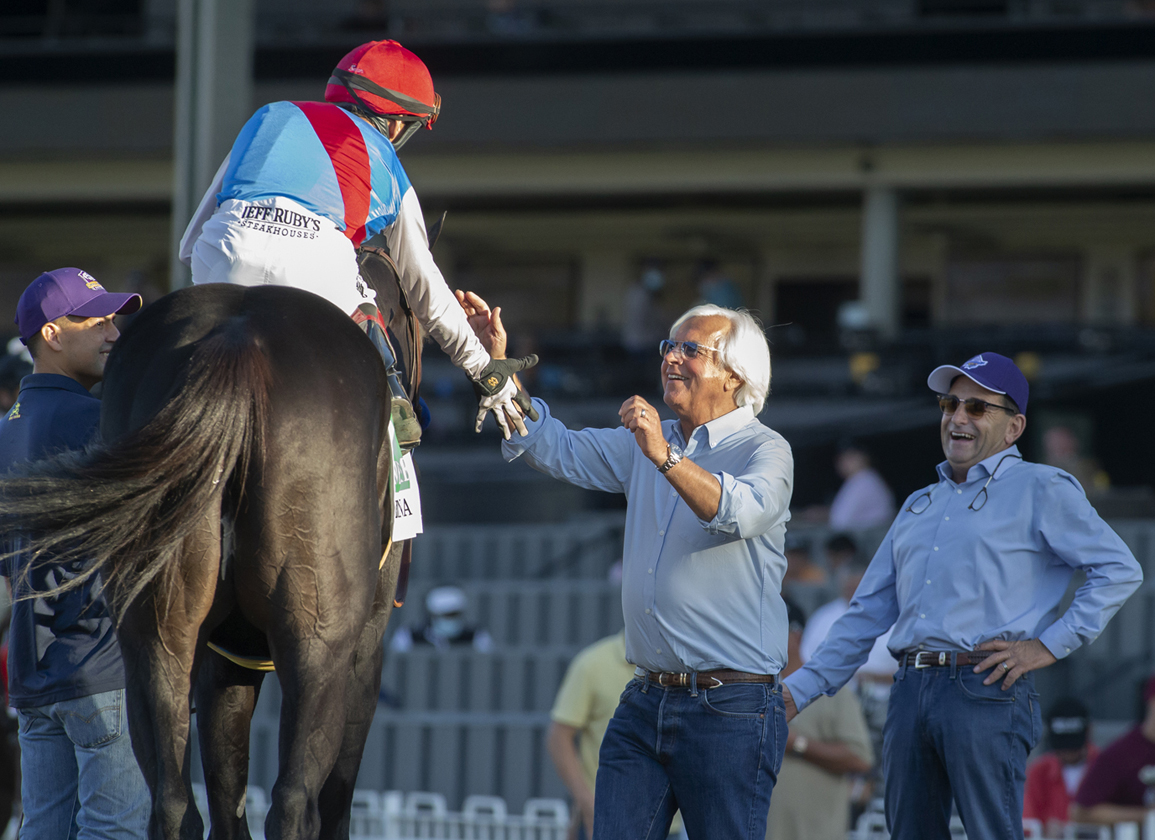By T. D. Thornton
After having failed back in October to get a federal judge to block the New York Racing Association (NYRA) from moving forward with a Jan. 24 hearing that could once again bar him from NYRA tracks, trainer Bob Baffert asked the hearing officer who will preside over the case to either recuse himself and/or dismiss the proceeding entirely because NYRA “self-created” the hearing process when it didn't have the authority to do so.
On Wednesday, hearing officer O. Peter Sherwood said no to both motions.
So starting Monday, at what is expected to be a multi-day hearing, Baffert must answer to a three-count complaint filed against him by NYRA in the form of a “statement of charges.”
Those three counts correspond to Baffert's alleged conduct that is or has been “detrimental” to three entities: 1) The best interests of racing”; 2) The health and safety of horses and jockeys; 3) NYRA business operations.
Separately, NYRA is defending itself in a federal lawsuit initiated by the Hall of Fame trainer with the well-publicized history of equine drug positives over whether or not NYRA violated Baffert's constitutional rights by trying to ban him outright without any type of hearing back on May 17.
NYRA currently has an active motion to dismiss that complaint, but no ruling has yet been issued by the judge, who heard arguments from both sides Jan. 6. That dismissal motion is not directly related to the Jan. 24 non-court hearing Baffert sought to avoid.
“Baffert argues that I must recuse myself because: (i) he supposes, without any evidence whatsoever, that I may have some pecuniary interest in the outcome of this proceeding; and (ii) that I have somehow demonstrated that I have pre-judged the merits of the hearing,” Sherwood wrote in a Jan. 19 ruling. “Both assertions are false. Recusal is not only unwarranted, but acceding to the demands would impair to the efficient administration of justice.”
Baffert had taken umbrage with the fact that NYRA had chosen the rules of the hearing, the charges within it, and the person who would adjudicate it.
Baffert's legal team had argued via the Jan. 12 recusal motion that Sherwood “has refused to disclose the complete and true extent of his relationship with NYRA” and that “Sherwood was chosen after a secret process within NYRA.”
That same filing also stated that, “Baffert's competitors, some of whom raced directly against him in the [GI] Kentucky Derby have their hands all over this 'proceeding.'”
Despite that allegation, Baffert's filing did not state any specific names of owners or trainers whom he believed might be conspiring against him by attempting to influence the hearing.
NYRA had barred Baffert back 16 days after the now-deceased Medina Spirit won the May 1 Derby while testing positive for an overage of betamethasone. In the 12 months prior to that positive, four other Baffert trainees had also tested positive for medication overages, two of them in Grade I stakes.
On July 14, the United States District Court (Eastern District of New York) granted Baffert a preliminary injunction that allowed him to race at New York's top-tier tracks pending the resolution of his overall case.
While that ruling allowed Baffert to start horses at Saratoga Race Course, Belmont Park and Aqueduct Racetrack, NYRA additionally took the judge's order to mean the association could move forward with drafting new procedures for holding hearings that could suspend licensees who engage in injurious conduct.
After those rules were made public, NYRA, on Sept. 10, wrote a letter summoning Baffert to appear at just such a hearing, presenting him with the statement of charges.
On Sept. 22, Baffert filed a motion asking a federal judge to hold NYRA in civil contempt for trying to schedule any sort of hearing that could once again bar him from participating at NYRA's tracks. He claimed NYRA's move to initiate that sort of hearing was in violation of the preliminary injunction.
But on Oct. 5, a federal judge dismissed Baffert's “contempt” allegations, underscoring that NYRA could, in fact, move forward with its newly created hearing process because it was entirely separate from NYRA's original May 17 attempt at banishing Baffert.
Not a subscriber? Click here to sign up for the daily PDF or alerts.






